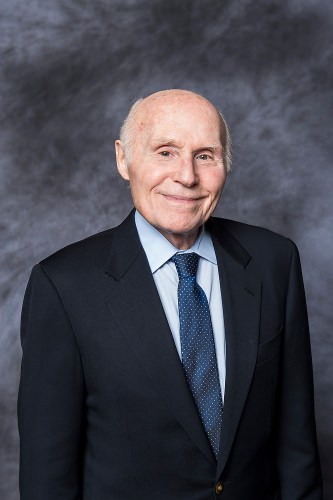Kohl’s $1.5 million gift to fund La Follette School research
A $1.5 million gift from Herb Kohl Philanthropies will support faculty research at the University of Wisconsin–Madison’s Robert M. La Follette School of Public Affairs.
The gift will create the Herb Kohl Public Service Research Competition, which will sponsor research that provides evidence-based information to address difficult public policy and governance issues.

Former U.S. Senator Herb Kohl is president of Herb Kohl Philanthropies, which has donated $1.5 million to support faculty research at the University of Wisconsin–Madison’s Robert M. La Follette School of Public Affairs. Photo: Jeff Miller
Award recipients will be chosen based on the relevance, importance and impact of the research. Students will obtain experience as research assistants applying the policy analysis skills they learn at the La Follette School.
“The La Follette School is a critical academic unit at UW–Madison, especially in an atmosphere of heightened partisanship and polarization,” says Kohl, a former U.S. senator who serves on the La Follette School’s Board of Visitors. “By funding applied research, this gift also is meant to help the La Follette School attract and retain the best and brightest faculty members in our state.”
La Follette School Director Susan Yackee says the Kohl Competition will help keep top faculty at UW–Madison because the best faculty members want to work on cutting-edge research that improves society. The research competition will fund activities such as the hiring of student assistants, collection or analysis of data, and dissemination of results.
“Society’s most challenging problems rarely resolve themselves,” Yackee says. “New idea creation and applied, nonpartisan research are needed to move the state and nation forward.”
A proud alumnus of UW–Madison, Kohl donated a $25 million lead gift for the Kohl Center athletic facility on campus. Kohl, who is president of Herb Kohl Philanthropies, received his bachelor’s degree in American institutions at the university in 1956. After 24 years in the Senate, Kohl retired in 2013.
The awards from the Herb Kohl Public Service Research Competition will go to faculty members with the most innovative ideas, Yackee says. Research may support discoveries in areas such as job training programs for Wisconsin, new ways of alleviating poverty in Milwaukee and elsewhere, the politics of genomics, and international monetary policy.
“This is, by far, the largest single donation to the La Follette School, and I want to express our utmost gratitude,” Yackee says.
The funds will be spent over five years. Further details about the research competition will be posted on the La Follette School website when they become available.




